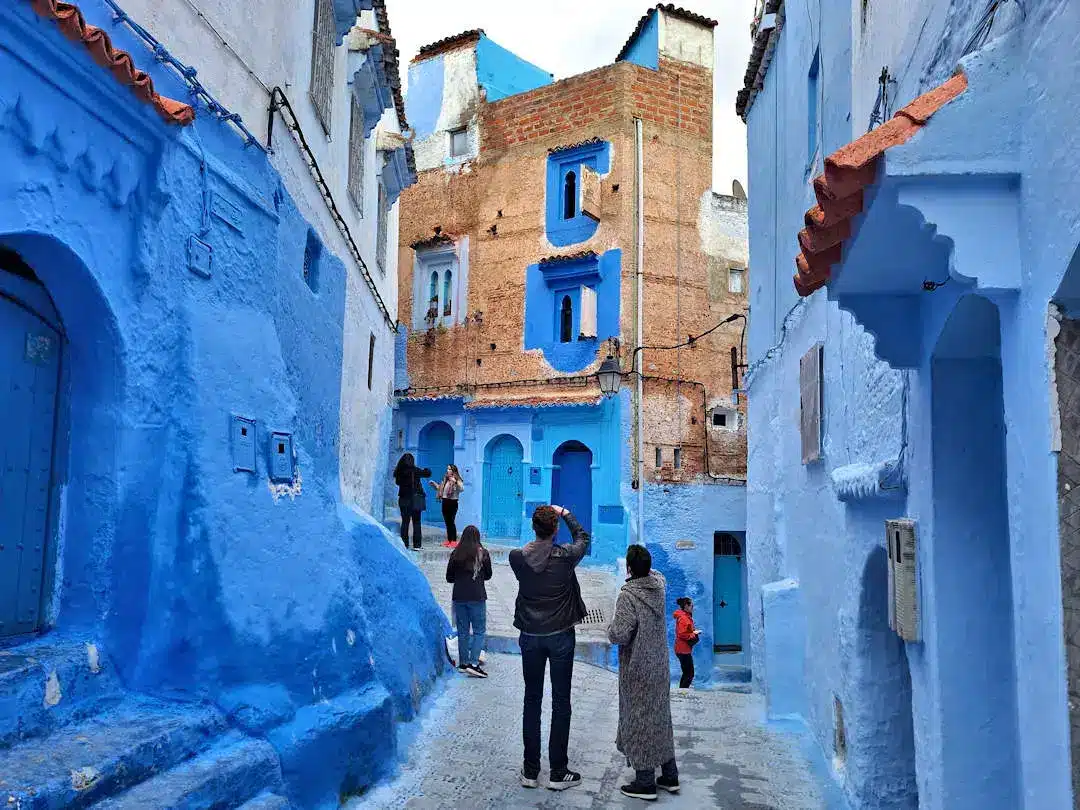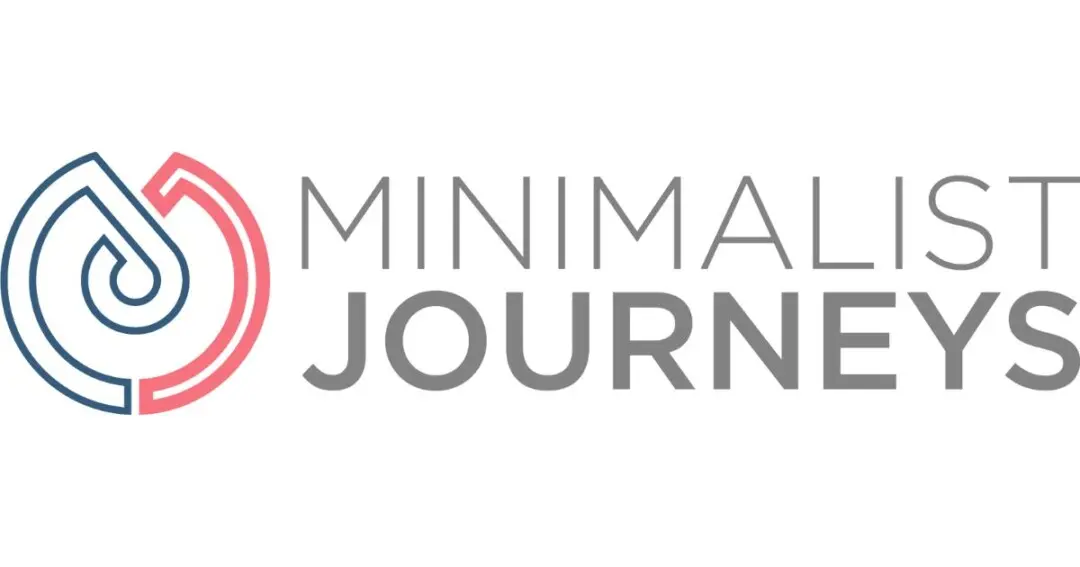This article may contain links to products and services we use and recommend. We may receive compensation when you click on links to those products. For more information, see our Disclosure Policy.
Morocco is known for its historical cities and architecture, desert landscapes, cultural experiences, coastal towns, gastronomy and more. We experienced it all, and while you can easily go for the 5-star treatment and splurge, we opted for the standards and experiences that have allowed us to live location-independently for over seven years. If you’re planning a trip to Morocco that’s sustainable AND doesn’t break the bank, our Morocco budget travel article is for you.
First of all: What currency is used in Morocco?
For those of you who’ve never been to Morocco: The country’s official currency is the Moroccan Dirham. The official currency code is MAD, though you may also find DH being used. The Moroccan Dirham was introduced as the national currency in 1960, replacing the Moroccan Franc.
During your travels, you might come across:
- Banknotes in denominations of 20, 50, 100 and 200 dirhams; and
- Coins in denominations of 1/2, 1, 2, 5 and 10 dirhams, as well as smaller denominations of 1, 5, 10 and 20 santimat.
There have been discussions about updating the design of the currency since 2010, but no major changes have been implemented yet.
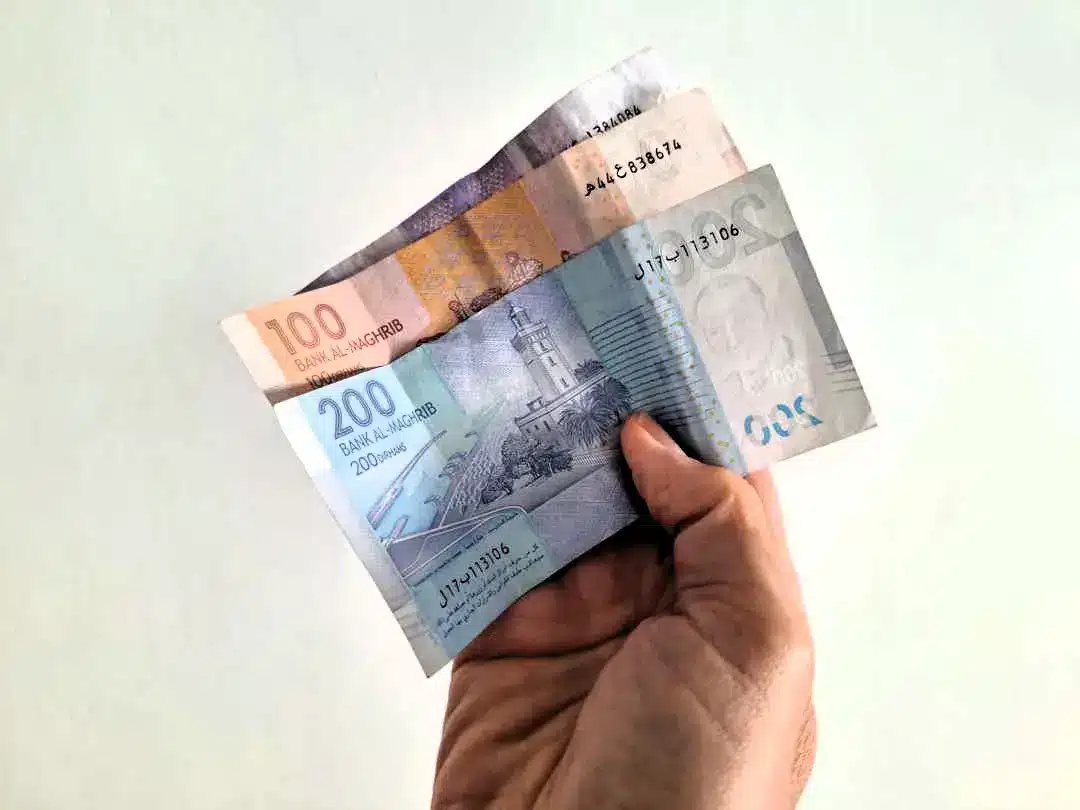
As a closed currency, Moroccan Dirhams can only be exchanged from/to your home currency in Morocco
How much is 1 Moroccan Dirham in my home currency?
Do you want to know how much to exchange from your home currency to MAD? We use the XE Currency Converter Calculator. Do be aware though that the Moroccan Dirham is a closed currency, which means you can only exchange your home currency into MAD once you get to Morocco. Likewise, you can only exchange any leftover MAD in Morocco.
And speaking of exchanging money… It’s also worth knowing: ATMs in Morocco do not always work (when you need them). Thus, it’s best to bring some extra EUR/GBP/USD notes with you to exchange if need be. Money changers are frequently used, and compared to other countries, their rates are decent.
Travel Cost Assumptions
When reading this article, please note that our travel costs are based on a couple travelling together. We are independent, budget-conscious travellers, researching and organising our itineraries using our go-to travel planning tools.
Our travel style is reasonably consistent wherever we go, which is excellent when you want to compare travel costs between destinations and over time:
- Accommodation: We usually stay in self-catered accommodation (homestays, locally owned guesthouses, hostels and short-term rentals) - in our room with (preferably) a private bathroom, though the kitchen and other areas may be shared.
- Dining and Groceries: We usually eat two meals a day at home. But we like to eat out once a day or at least every few days (and prefer locally owned restaurants and small eateries away from the tourist hotspots).
- Experiences: Many of our activities are free or low-cost. When we pay for attractions or activities, we are very selective, as our funds are limited, just like everyone else's (while we're travel bloggers, we seldom get a free ride).
- Transportation: We walk frequently and use public transportation wherever possible. We only occasionally hire a vehicle. The costs to enter or exit a country are not included (though we may include them for reference in the comments).
- Other: Our total daily costs also include mail scanning and forwarding services (as we are location-independent), our mobile phone and data plans, and travel insurance, although only as they relate to the time spent at our destination.
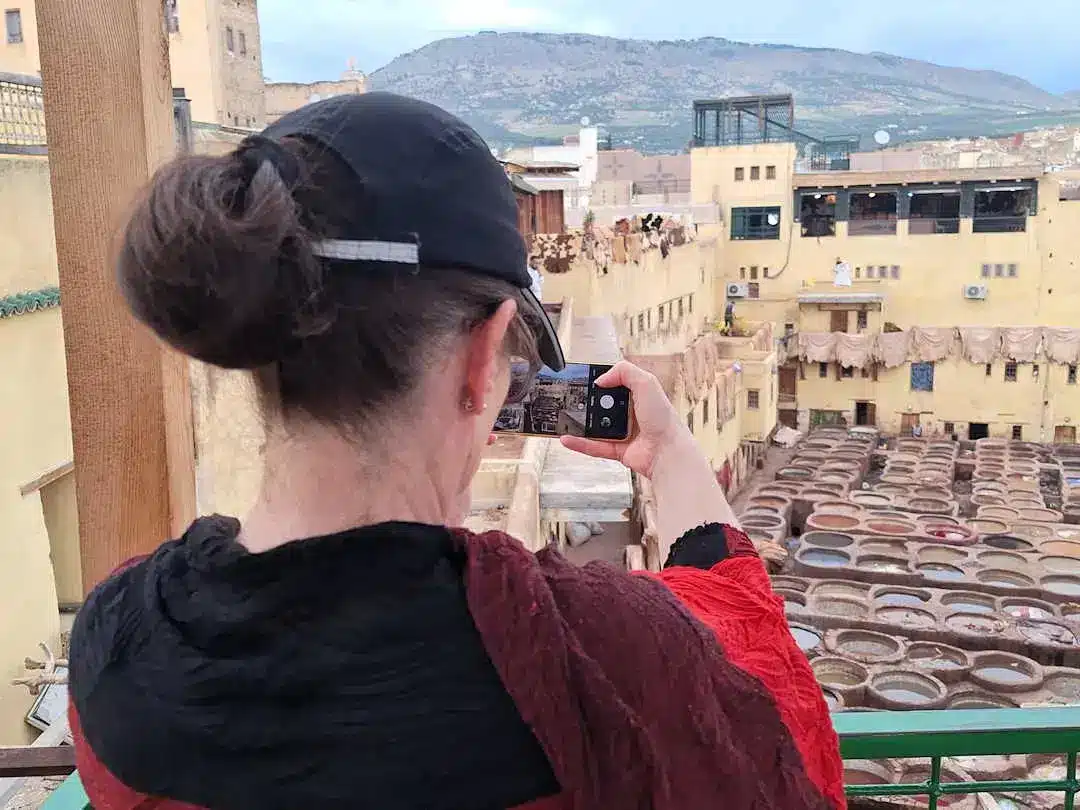
Our travel budget for Morocco is representative of a couple that travels slowly, independently and sustainably
How much did it cost us to explore Morocco?
Considering the above assumptions, we spent on average MAD456.47 / USD45.47 per person per day which is below our Morocco travel budget of USD50 per person per day. Thanks, Nomadic Matt.
Below is a summary of the expenses we incurred during the 45 nights we stayed in Morocco:
| Category | MAD Cost Per Person Per Day | USD Cost Per Person Per Day | Percentage of total |
|---|---|---|---|
| Accommodation | 175.70 | 17.50 | 38.5% |
| Groceries and Dining | 127.91 | 12.74 | 28.0% |
| Transportation | 66.04 | 6.58 | 14.5% |
| Experiences | 28.08 | 2.80 | 6.2% |
| Miscellaneous | 58.74 | 5.85 | 12.9% |
| Total per person per day | 456.47 | 45.47 |
One of the many reasons we visited Morocco was for me to run in the Marrakesh Marathon. Apart from Marrakesh, we also stayed in Taghazout, Essaouira, Meknes, Fes, Chefchaouen and Tangier. And we did a 10-day road trip around the Atlas Mountains and desert beyond, with one or two nights at each location.

Many of the experiences we did in Morocco were free or cost very little
How much to budget for Accommodation in Morocco?
During our 45 nights in Morocco, our accommodation costs averaged MAD347 / USD34.55 per room per night. We stayed in locally owned guesthouses/standard Riads, where we would have our own bedroom and bathroom (and shared living spaces), or in a short-term rental apartment (again locally owned) with a small kitchen (and laundry facilities where possible).
The table lists all accommodations we stayed at, including places we wouldn’t choose to stay again (a tick marks those we’d be happy to return to). All accommodations had free Wi-Fi (some faster than others). Where provided, breakfast is included in the below price. Where charged, tourism/city taxes are also included.
| Name | Location | Type | MAD Cost Per Night | Book Now |
|---|---|---|---|---|
| Kasbah du Peintre | Ait Ben Haddou | Guesthouse/Riad | 431 | Book Now |
| Chefchaouen Airbnb | Chefchaouen | Apartment | 308 | Book Now |
| Riad Dreams Dades | Dades Gorge | Guesthouse/Riad | 235 | Book Now |
| Anwars Place | Essaouira | Apartment | 365 | Book Now |
| Riad Blue Oasis | Fez | Guesthouse/Riad | 368 | Book Now |
| Chez Jerome et Pamela | Marrakesh | Guesthouse/Riad | 557 | Book Now |
| Dar Othman | Marrakesh | Guesthouse/Riad | 339 | Book Now |
| Othmane Apartment | Marrakesh | Apartment | 495 | Book Now |
| Riad Andalousse | Meknes | Guesthouse/Riad | 350 | Book Now |
| Authentique Berber Camp | Mhamid El Ghizlane | Tent | 368 | Book Now |
| Maison dhotes Dar El Nath | Ouarzazate | Guesthouse/Riad | 450 | Book Now |
| Ecolodge du Draa | Ouled Otmane | Guesthouse/Riad | 300 | Book Now |
| Shtotl Taghazout Flat | Taghazout | Apartment | 335.50 | Book Now |
| Panama Residence | Tangier | Apartment | 453 | Book Now |
| Dar Relax Hostel | Todgha Gorge | Guesthouse | 250 | Book Now |
Our most expensive accommodation was Chez Jerome et Pamela, a (more fancy) Riad in Marrakesh’s medina. While more modern than other places we’ve stayed at, we wouldn’t stay there again, as it was very noisy/poorly soundproofed, and the service was transactional/indifferent.
Our most affordable accommodation was the Riad Dreams Dades, a family-run guesthouse close to the Dades Gorge hiking trails. The Riad was modern and clean, the food delicious with huge portions, and the service impeccable. Goes to show: expensive isn’t always better.

We loved staying in locally owned accommodation, including in traditional courtyard houses/Riads
Laundry and Washroom use
During the 6 1/2 weeks in Morocco, we used laundromats/laundry services four times, costing us a total of MAD195.00 / USD19.42 (or MAD48.75 / USD4.86 per use).
Using mostly bathrooms in restaurants or museums when we were out and about (which were usually free of charge), we only had to pay for toilet use three times in 45 nights, costing us a total of MAD6.00 / 60 US cents (or MAD2.00 / 20 US cents per use).

While in Morocco, we would use laundromats like this one in Marrakesh or the washing machine/service at our accommodation where available
How much to budget for Dining and Groceries in Morocco?
Groceries and dining in Morocco cost us on average MAD127.91 / USD12.74 per person per day. This does not include the cost for breakfast provided by locally owned guesthouses we stayed at.
Most of this expense category would be related to dining, as we would dine out at least once a day, even when we had a kitchen at our disposal, as we want to experience the different local dishes around the country. Dining out at local/non-touristy eateries is budget-friendly, with a meal at a simple local restaurant costing MAD50-100 / USD5-10 per person, even in tourist hotspots like Marrakesh.
We dined twice at La Table De La Kasbah [Google Maps location] and Le Nid´cigogne [Google Maps location], both family-owned Moroccan restaurants in the Kasbah area in Marrakesh. It always says something about the establishment if you return there, especially with so many other choices available. We also ate several times at the Clock Cafes – there are three in Morocco (in Marrakesh, Chefchaouen and Fes) – we dined in the first two.

Family-run eateries off the beaten tourist path are affordable and great places to discover Moroccan cuisine
Our most expensive meal out was at Yuba in Meknes, a Moroccan restaurant with a rooftop terrace overlooking the city. For two main meals, a beer and a Moroccan tea, the price was MAD330 / USD32.87 (the tea alone was MAD45 / USD4.48).
The cost of consumer staples also varied significantly pending the sales location (local market/shop vs international supermarket chain) and type of food (locally grown/made vs imported):
- Basic items like bread or (locally grown) fruit and vegetables are (very) reasonably priced at local markets/shops. For example, a loaf of (Moroccan white) bread cost MAD1-2 / 10-20 US cents and bananas MAD10-15 / USD1.00-1.49 per kilogram while we were there.
- On the flipside, imported goods like breakfast cereals, muesli bars, non-local cheeses, etc at supermarkets like Carrefour or Marjane may cost the same as (if not more than) at home. BIM supermarkets were the most affordable of the lot (but don’t stock a huge variety).

If you're after imported foods in Morocco, BIM supermarkets are more affordable than Carrefour or Marjane (but they also stock a smaller variety)
How much to budget for Transportation in Morocco?
Transportation in Morocco cost us MAD66.04 / USD6.58 per person per day. We explored the country mostly by public transportation (buses and trains).
Intercity Buses
Intercity, we travelled mostly on buses operated by Supratours and CTM. There was no real difference between the two operators when it came to reliability, price, cleanliness or comfort, and we would happily use either again. We would always choose whichever timetable suited us best, the exception being between Fes, Chefchaouen and Tangier – of the two companies, only CTM services that route.
You can check the schedules on the official websites (CTM | Supratours). I recommend buying your tickets in advance online. Seats fill up quickly, especially in peak periods. Alternatively, if you arrive at a destination by bus and have a few days until your departure, you could also buy a ticket for your onward journey in person before leaving the bus terminal.
The only other time we used an intercity bus that was not Supratours or CTM was between Taghazout and Essaouira (neither of them service the route). In this case, we walked to the roundabout above town [Google Maps location] to flag down a bus headed for Essaouira. We arrived at 9:30, and managed to flag down the first bus that went past at about 9:45 – faster and easier than we thought. The alternative would have been joining a collective taxi from the parking lot at the edge of town [Google Maps location], but that would have been a lot more cramped during the 2 hours 45 minutes’ ride along the coast.
| Company | From | To | Fare Per Adult (MAD) |
|---|---|---|---|
| Supratours | Marrakesh | Agadir | 120 |
| Trans Al Yamama | Taghazout | Essaouira | 50 |
| Supratours | Essaouira | Marrakesh | 100 |
| CTM | Fes | Chefchaouen | 120 |
| CTM | Chefchaouen | Tangier | 65 |
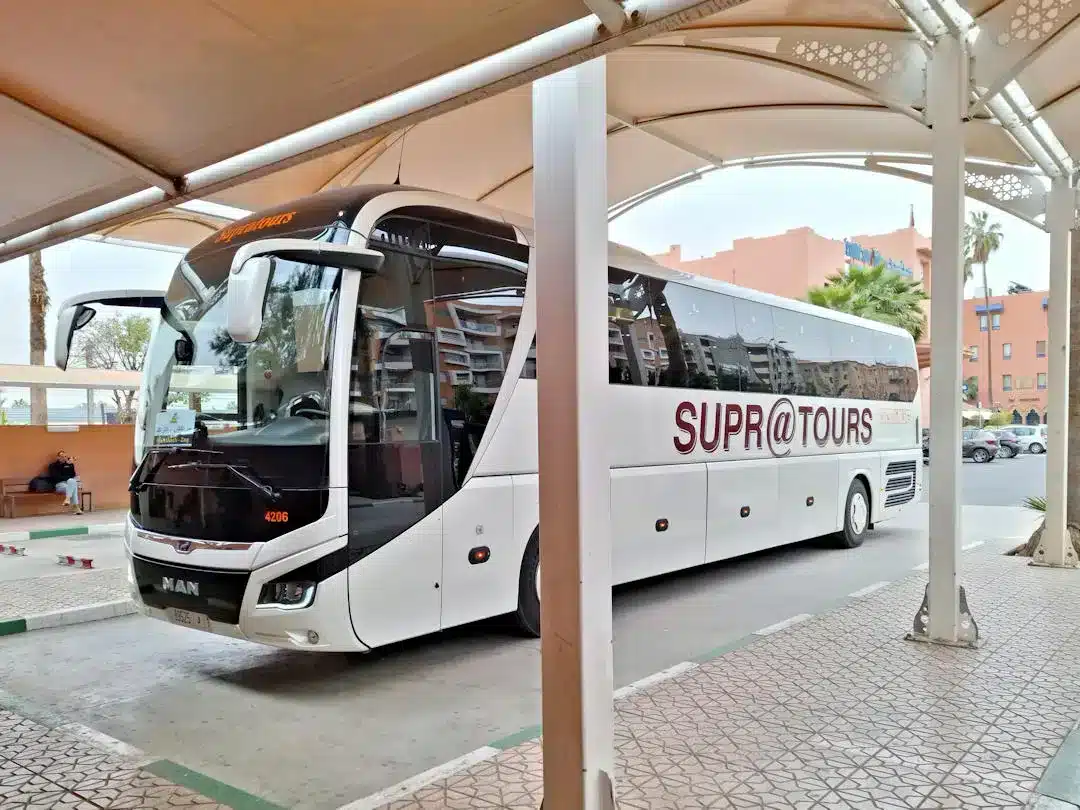
Supratours and CTM are the cleanest and most reliable intercity buses in Morocco
Trains
Morocco has a decent railway network, and we would use the train over internal flights or intercity buses where possible.
Travelling by train in Morocco is not only comfortable but also affordable. For example, covering the 575 kilometres between Tangier and Marrakesh cost us MAD340 / USD33.86 per person (barely 6 US cents per kilometer). Trains are operated by ONCF (the same company Supratours belongs to).
| From | To | Fare Per Adult (MAD) |
|---|---|---|
| Marrakesh | Meknes | 216 |
| Meknes | Fes | 33 |
| Tangier | Marrakesh | 340 |

Travel on standard ONCF trains is comfortable and affordable - there is even catering on board
Part of our final train journey in Morocco – from Tanger Ville to Casablanca Casa Voyageurs – was on the Al Boraq, Africa’s first and (so far) only high-speed train. Akeen to travelling on the TGV in France or ICE in Germany (though less crowded and on time), the journey was very comfortable. The Al Boraq travelled even faster than the Shinkansen in Japan: we recorded a maximum speed of 320km/h.

The Al Boraq train journey is comparable with travel on the TGV or ICE but much more affordable
Local Buses
The Marrakesh city bus service operated by Alsa is reliable and easy to use – even for a foreigner. Wherever we coudn’t walk in Marrakesh, we used the bus. Do be aware though that the buses are old, don’t have airconditioning and are always packed with locals (with the exception of the L19 tourist bus between the airport and city centre). Alsa Bus timetables are available in Google Maps. The ticket fare (MAD4.00 / 40 US cents) is paid in cash to the bus driver when you enter via the front door. Change is generally given, but do bring smaller denominations as much as possible.
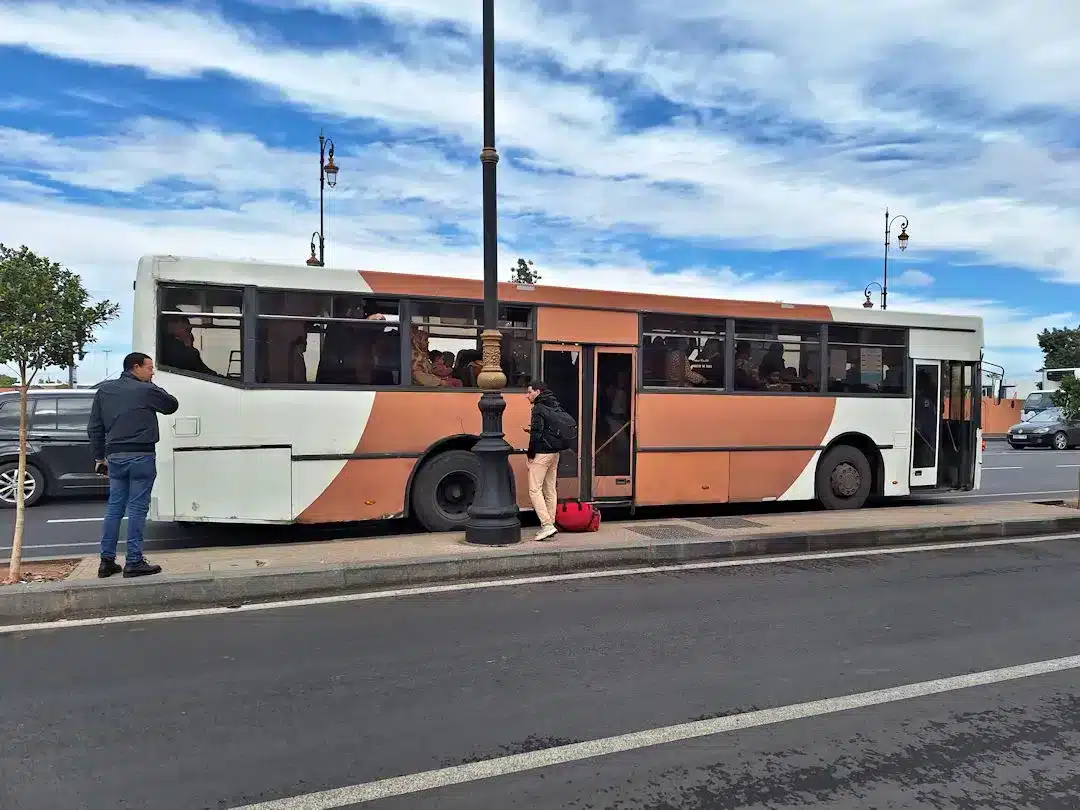
Local buses (like this Alsa bus in Marrakesh) are an affordable option to travel between the transportation hubs and old towns
Fes City Buses are also regularly crowded (but a bit more modern than those in Marrakesh). And a ride is even cheaper than in Marrakesh: MAD2.50 / 25 US cents per single ride (again paid in cash). Very handy: The (Mini)Bus #19 goes from outside the train station [Google Maps location] to Place Rcif in the medina (and vice versa). This was the only bus we ever needed to use in Fes – we covered everything else on foot. Unfortunately, Google Maps does not show routes or timetables (only the bus stops). If unsure, it’s best is to ask your host (or a local at the bus stop) which bus to take.
In Meknes, we used local bus #15 to travel from Bab Berdieyinne [Google Maps location] to the roundabout near Volubilis [Google Maps location] (walking from there the final 2.5km to the archaeological site) and from Moulay Idriss Zerhoun [Google Maps location] back to Meknes. The bus ride cost us MAD7 / 70 US cents per person each way. In either direction, the bus was only half-full.

As local public transportation, city buses in Morocco can get crowded and route maps/timetables are not easy to come by
Taxis
During our time in Morocco, we only took a taxi a handful of times. Payment was always in cash.
| Company | From | To | Fare Per Adult (MAD) |
|---|---|---|---|
| Agadir Taxi | Agadir | Taghazout | 40.00 |
| Meknes Taxi | Meknes Station | Running Event | 11.25 |
| Meknes Taxi | Accommodation | Meknes Station | 12.50 |
| Fes Taxi | Accommodation | Fes Station | 15.00 |
Our first taxi experience was in Agadir. On a day with pouring rain, the local Alsa Buses to Taghazout didn’t turn up, and after waiting for over an hour, we ended up sharing a taxi with three other stranded travellers. As we learned later, MAD200 / USD19.92 for the journey was way overpriced. Though, given we were cold and wet, and just wanted to get to our destination, MAD40 / USD3.98 per person was a price we were willed to pay.
If you don’t want to haggle with a taxi driver or be overcharged, use the Roby app (Morocco’s version of Uber) – currently available in Agadir (yes, we didn’t know it back then), Casablanca and Marrakesh (more cities are in the pipeline).

Petit taxis operate within a city's boundary and fit up to 3 passengers
Rental Car
We also hired a car for a 10-day road trip around the Atlas Mountains and desert beyond, travelling a total of 1,291 kilometres. The total costs (including vehicle hire, fuel and parking fees) averaged MAD308.90 / USD30.77 per day (or MAD2.39 / 23 US cents per kilometre).
At MAD15.00 / USD1.49, parking overnight outside the KasbahTaourirt was the most expensive. Using a diesel vehicle, we paid on average MAD13.02 / USD1.30 per litre of fuel.
How to find the best deals on rental cars
Most of the time, we use public transport to get us around. But occasionally, hiring a car or scooter just makes it easier or gets us to places we couldn't go without a set of wheels. Whenever we do hire a vehicle, our first point of call are local rental providers. A quick Google Maps search shows who's near us. We then check the reviews and only contact those other travellers had good experiences with.
If we can't find anyone we're comfortable with, we search for deals on aggregator websites. We've used Rentalcars.com and DiscoverCars.com in the past and had only good experiences with them. Both partner with trusted brands like Hertz, Avis, Budget or Europcar (and in some locations even local providers) - so you can compare car hire options in a similar way you'd compare accommodation offers across Agoda and Booking.com.

When hiring a car in Marrakesh, choose the airport as pick-up/drop-off point to avoid having to navigate through (the worst of the) city traffic
How much to budget for Experiences in Morocco?
Our average spend for experiences was MAD28.08 / USD2.80 per person per day.
Most of this expense category is made up of entry fees to museums (in the broadest sense of the word), with fees ranging from MAD30.00 / USD2.99 to MAR100.00 / USD9.96 per adult. Our favourite museums were
- the Medresa Ben Youssef, Musée MACMA and the Moroccan Culinary Arts Museum in Marrakesh;
- the Tiwirga Art Museum in Aït Benhaddou (for the variety of artworks exhibited and the opportunity to meet resident artist Hafida Zizi);
- the Casbah Des Arts in Agdz (for its character and gorgeous views);
- the Bibliothèque Coranique in Tamegroute (for its treasure of ancient books);
- the Dar Jamai Museum in Meknes and nearby archaeological site of Volubilis.
We also joined Free Walking Tours in Marrakesh, Essaouira and Fes (all very different in character). While FREE by name, the local guides earn a living from the tips received, and we always tip at the end of the walk based on the quality of the experience.

One of many memorable (and free) experiences in Morocco: Sitting around the campfire in the desert with our berber host family
What other costs should you budget for when planning a trip to Morocco?
During our 45-night stay in Morocco, we incurred miscellaneous expenses totalling MAD58.74 / USD5.85 per person daily. Since we are location-independent, some expenses may not apply to you.
Communication
Upon arrival at Marrakesh Airport, we purchased two physical SIM cards for MAD100.00 (USD9.96) each, providing us with 20GB of data for 30 days. Given that our trip was extended by 15 days, we topped up each SIM card with another MAD100.00 (USD 9.96) to ensure uninterrupted connectivity. Alternatively, if you prefer to sort out your communication needs before arrival, consider using an eSIM like Airalo’s eSIM, which offers 5GB of data for USD31 for 30 days or Unlimited data for 10 days for USD35. This option is particularly convenient for travellers who want to avoid dealing with physical SIM cards or visiting local shops.
Wellbeing
While not cheap at MAD725.00 / USD72.21, a massage, taken before the Marrakesh Marathon, was very beneficial in preparing my muscles for the strenuous event, an experience detailed in our Marrakesh Marathon guide.
Sandra and I also had annual dental checkups in Marrakesh, which cost MAD500.00 / USD49.80 each. Unfortunately, unlike our very positive experience with dental treatments in Türkiye, the experience did not meet our expectations.
I also spent a total of MAD150.00 / USD14.94 on two haircuts.

If you need a haircut during your trip to Morocco, no problem - It may even be cheaper than at home
Travel Insurance
During our trip to Morocco, we relied on a comprehensive travel insurance plan, covering a wide range of potential issues – from medical emergencies to travel disruptions and loss of luggage. The total cost of our travel insurance for the 45 nights in Morocco (pro-rated from our annual policy) was NZD465.13 / USD284.73 (or NZD5.17 / USD3.16 per person per day).
What else is worth knowing?
Should you tip in Morocco?
In Morocco, the question should rather be: When are you not expected to tip? as tipping is often even expected when someone helps you in the slightest way (like pointing out directions) or in exchange for a photo. But I’m getting cynical here.
In general, when it comes to tipping in Morocco, we would recommend using common sense:
- Leave a tip if you’ve been happy with the service in a restaurant or hammam (and it’s not already included on the bill as a service charge). In those cases, we would recommend 10% of your spend onsite.
- On the flip side, if a stranger follows you around, pretending to be your guide, and you can’t shake them off, walk away without a tip or pay the smallest amount you get away with (MAD20 / USD1.99 did the trick in cases we encountered).
How much cash do you need in Morocco?
Morocco is a cash society, so unsurprisingly, we paid 46% of our expenses in cash throughout our stay.
We recommend using Al Barid Bank to withdraw cash without incurring ATM withdrawal fees (charged by a Moroccan bank). These ATMs are often attached to Post Offices (Al Barid is the Financial Services subsidiary of Poste Maroc/the Moroccan Postal Service) and are thus available nationwide.
![Al Barid ATM Marrakesh Airport [object Object]](https://www.minimalistjourneys.com/wp-content/uploads/al-barid-atm-marrakesh-airport.webp)
Also bring some EUR, GBP or USD notes to exchange in case ATMs don't work when you need them
Enjoyed our guide to travel costs in Morocco and eager to dive deeper?
Unlock more budget travel secrets with our minimalist packing checklist tailored for budget travelers. This valuable resource will help you pack smart and light, ensuring you have all the essentials without overpacking. Learn how to optimise your travel gear, save money, and make the most of your Moroccan adventure. Join our community of savvy travelers today!
Before you go, if you liked our article and found it helpful, we would appreciate it if you could share it with your friends and family via the Share buttons below. Even better: Leave a short review on Trustpilot or Google, which would help us further build our online reputation as a (trustworthy and helpful) travel and lifestyle blog.

